Farming Business in Botswana Research 2022
VerifiedAdded on 2022/09/16
|11
|2505
|19
AI Summary
Contribute Materials
Your contribution can guide someone’s learning journey. Share your
documents today.
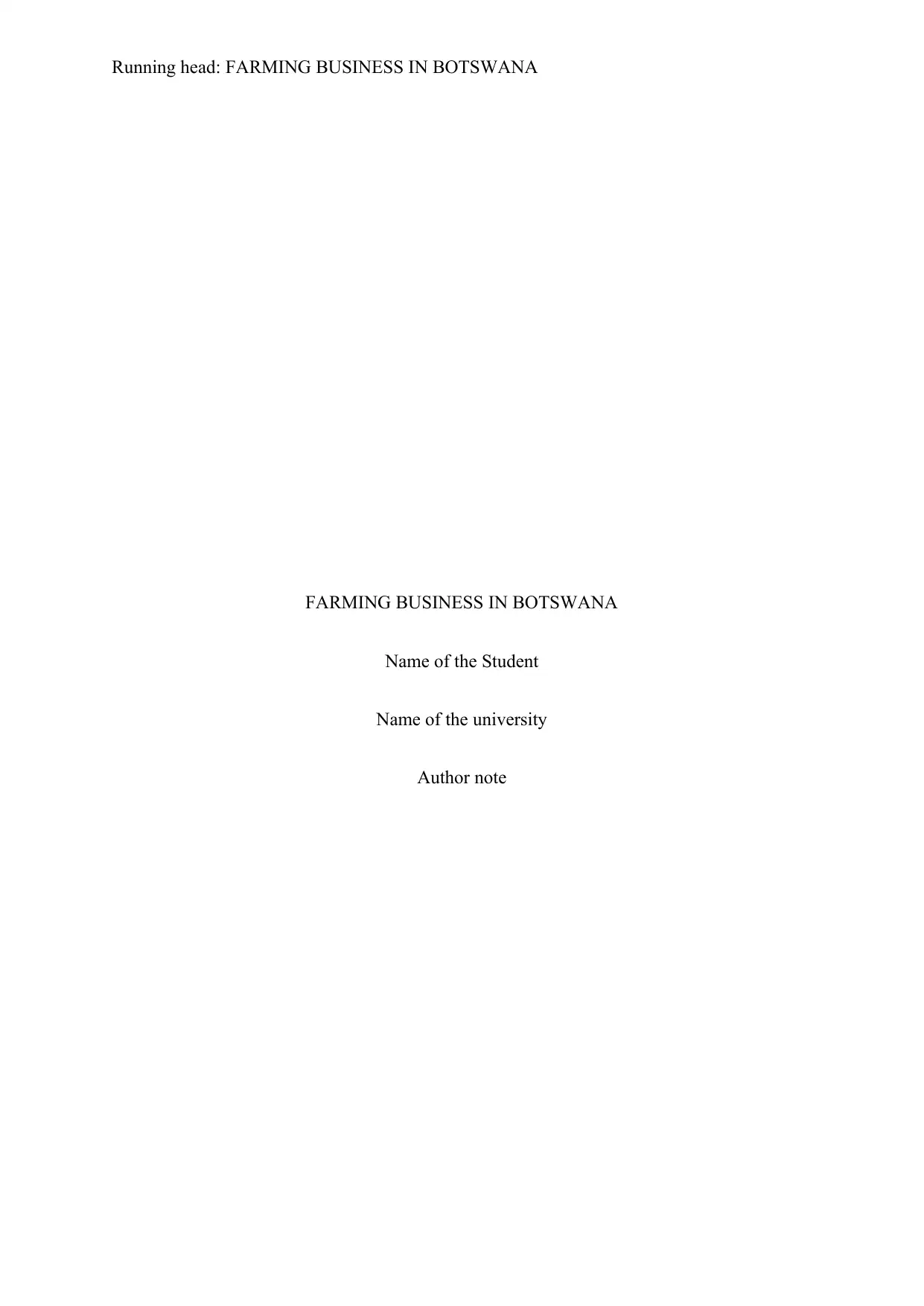
Running head: FARMING BUSINESS IN BOTSWANA
FARMING BUSINESS IN BOTSWANA
Name of the Student
Name of the university
Author note
FARMING BUSINESS IN BOTSWANA
Name of the Student
Name of the university
Author note
Secure Best Marks with AI Grader
Need help grading? Try our AI Grader for instant feedback on your assignments.
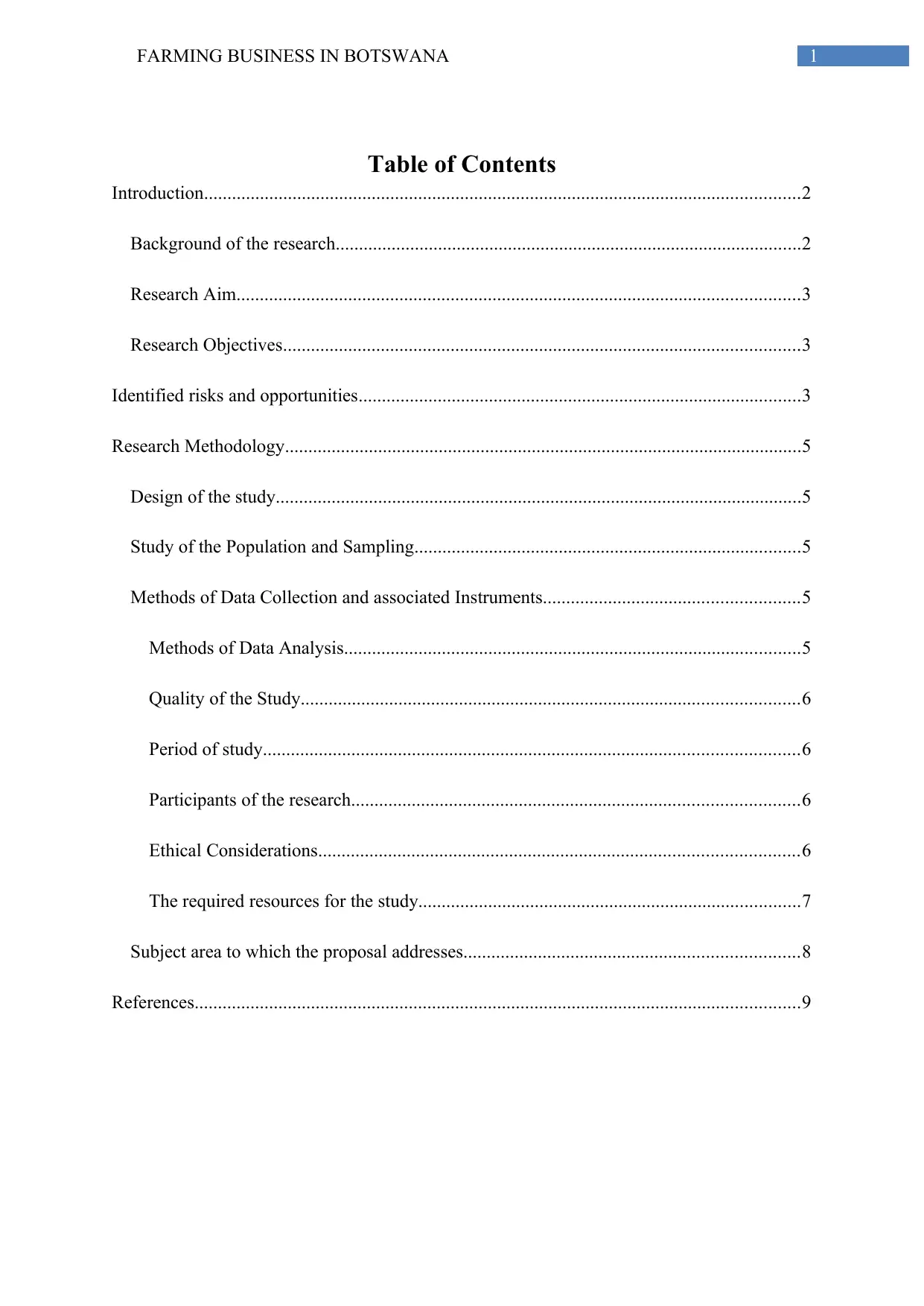
1FARMING BUSINESS IN BOTSWANA
Table of Contents
Introduction................................................................................................................................2
Background of the research....................................................................................................2
Research Aim.........................................................................................................................3
Research Objectives...............................................................................................................3
Identified risks and opportunities...............................................................................................3
Research Methodology...............................................................................................................5
Design of the study.................................................................................................................5
Study of the Population and Sampling...................................................................................5
Methods of Data Collection and associated Instruments.......................................................5
Methods of Data Analysis..................................................................................................5
Quality of the Study...........................................................................................................6
Period of study...................................................................................................................6
Participants of the research................................................................................................6
Ethical Considerations.......................................................................................................6
The required resources for the study..................................................................................7
Subject area to which the proposal addresses........................................................................8
References..................................................................................................................................9
Table of Contents
Introduction................................................................................................................................2
Background of the research....................................................................................................2
Research Aim.........................................................................................................................3
Research Objectives...............................................................................................................3
Identified risks and opportunities...............................................................................................3
Research Methodology...............................................................................................................5
Design of the study.................................................................................................................5
Study of the Population and Sampling...................................................................................5
Methods of Data Collection and associated Instruments.......................................................5
Methods of Data Analysis..................................................................................................5
Quality of the Study...........................................................................................................6
Period of study...................................................................................................................6
Participants of the research................................................................................................6
Ethical Considerations.......................................................................................................6
The required resources for the study..................................................................................7
Subject area to which the proposal addresses........................................................................8
References..................................................................................................................................9
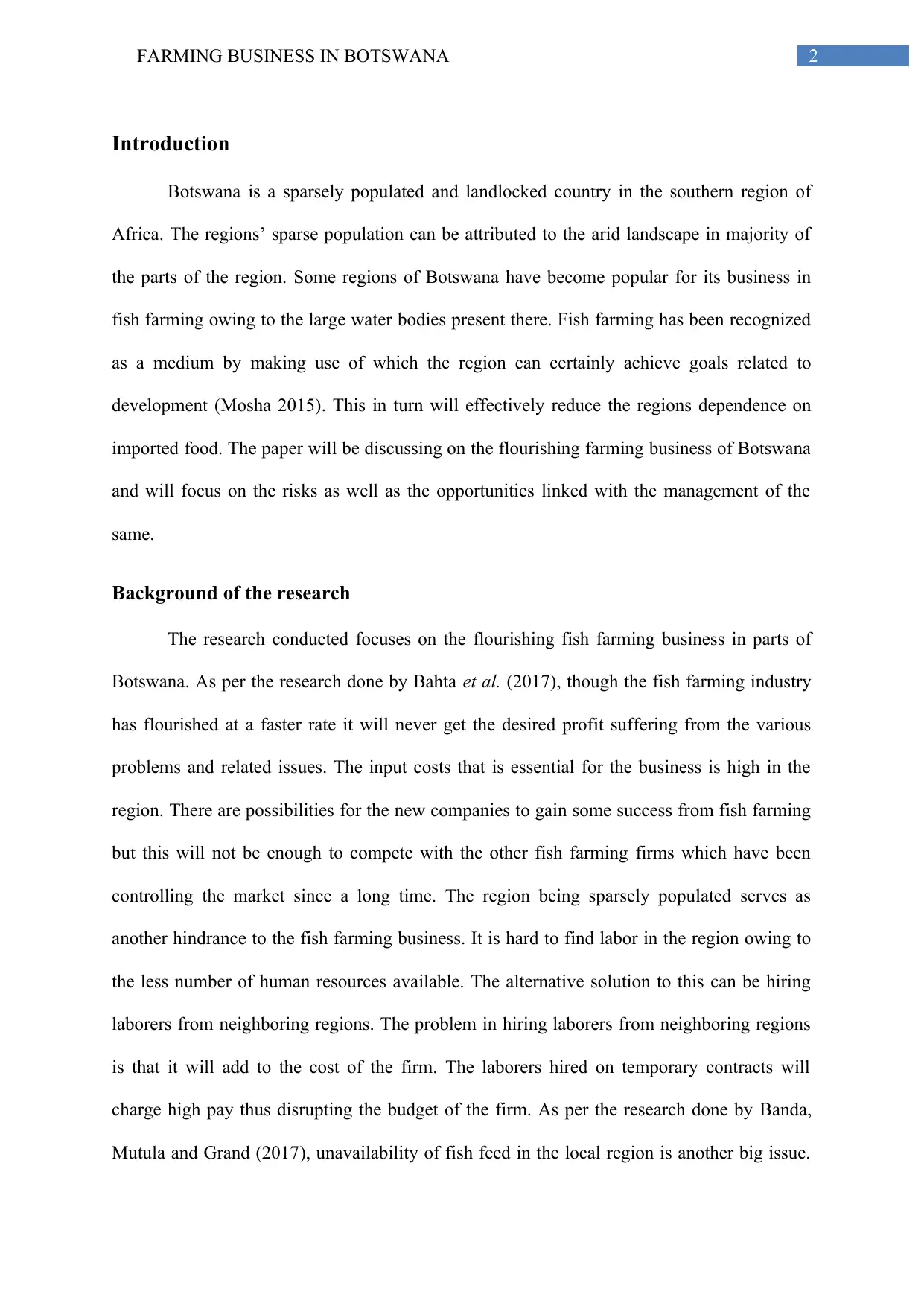
2FARMING BUSINESS IN BOTSWANA
Introduction
Botswana is a sparsely populated and landlocked country in the southern region of
Africa. The regions’ sparse population can be attributed to the arid landscape in majority of
the parts of the region. Some regions of Botswana have become popular for its business in
fish farming owing to the large water bodies present there. Fish farming has been recognized
as a medium by making use of which the region can certainly achieve goals related to
development (Mosha 2015). This in turn will effectively reduce the regions dependence on
imported food. The paper will be discussing on the flourishing farming business of Botswana
and will focus on the risks as well as the opportunities linked with the management of the
same.
Background of the research
The research conducted focuses on the flourishing fish farming business in parts of
Botswana. As per the research done by Bahta et al. (2017), though the fish farming industry
has flourished at a faster rate it will never get the desired profit suffering from the various
problems and related issues. The input costs that is essential for the business is high in the
region. There are possibilities for the new companies to gain some success from fish farming
but this will not be enough to compete with the other fish farming firms which have been
controlling the market since a long time. The region being sparsely populated serves as
another hindrance to the fish farming business. It is hard to find labor in the region owing to
the less number of human resources available. The alternative solution to this can be hiring
laborers from neighboring regions. The problem in hiring laborers from neighboring regions
is that it will add to the cost of the firm. The laborers hired on temporary contracts will
charge high pay thus disrupting the budget of the firm. As per the research done by Banda,
Mutula and Grand (2017), unavailability of fish feed in the local region is another big issue.
Introduction
Botswana is a sparsely populated and landlocked country in the southern region of
Africa. The regions’ sparse population can be attributed to the arid landscape in majority of
the parts of the region. Some regions of Botswana have become popular for its business in
fish farming owing to the large water bodies present there. Fish farming has been recognized
as a medium by making use of which the region can certainly achieve goals related to
development (Mosha 2015). This in turn will effectively reduce the regions dependence on
imported food. The paper will be discussing on the flourishing farming business of Botswana
and will focus on the risks as well as the opportunities linked with the management of the
same.
Background of the research
The research conducted focuses on the flourishing fish farming business in parts of
Botswana. As per the research done by Bahta et al. (2017), though the fish farming industry
has flourished at a faster rate it will never get the desired profit suffering from the various
problems and related issues. The input costs that is essential for the business is high in the
region. There are possibilities for the new companies to gain some success from fish farming
but this will not be enough to compete with the other fish farming firms which have been
controlling the market since a long time. The region being sparsely populated serves as
another hindrance to the fish farming business. It is hard to find labor in the region owing to
the less number of human resources available. The alternative solution to this can be hiring
laborers from neighboring regions. The problem in hiring laborers from neighboring regions
is that it will add to the cost of the firm. The laborers hired on temporary contracts will
charge high pay thus disrupting the budget of the firm. As per the research done by Banda,
Mutula and Grand (2017), unavailability of fish feed in the local region is another big issue.
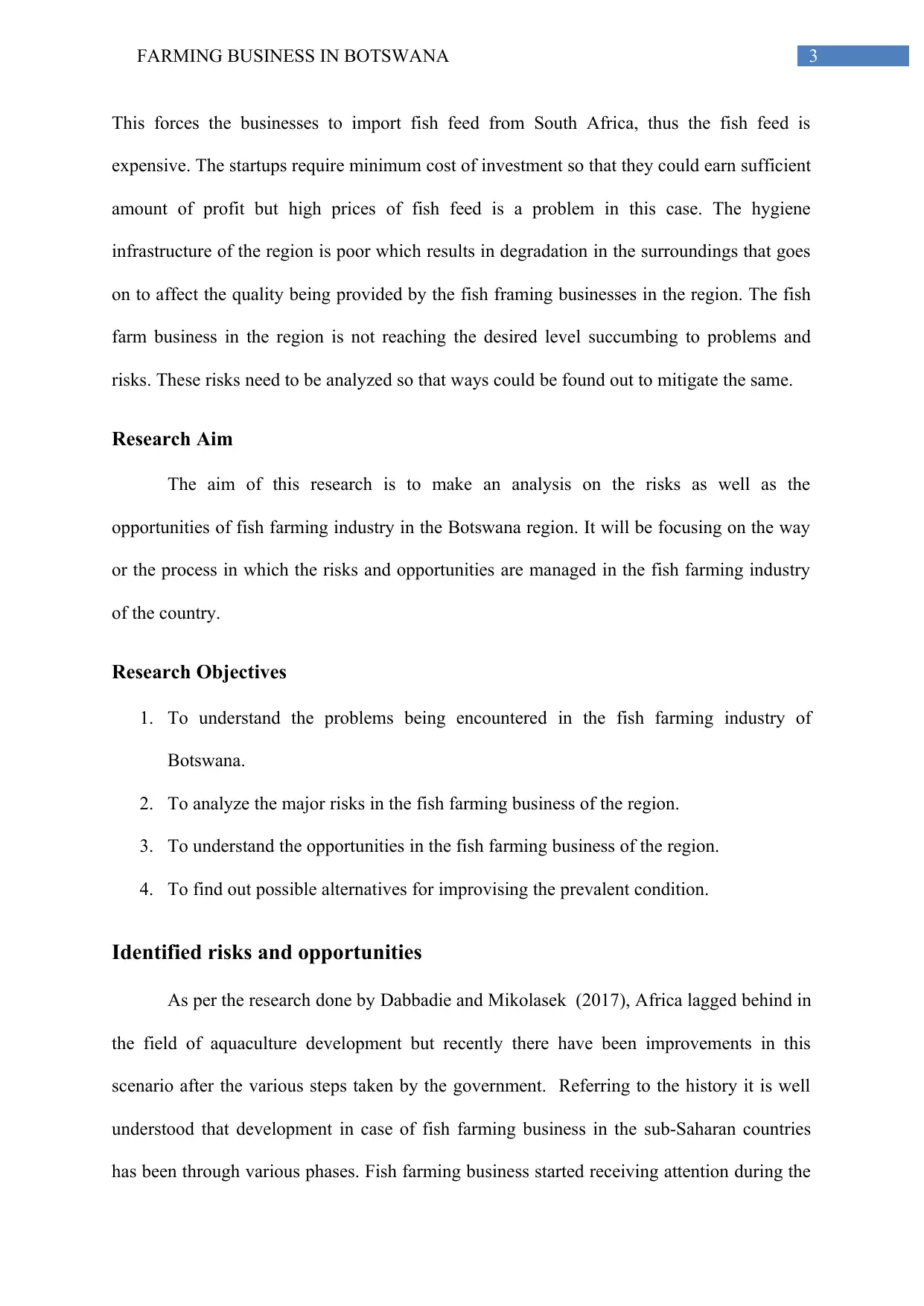
3FARMING BUSINESS IN BOTSWANA
This forces the businesses to import fish feed from South Africa, thus the fish feed is
expensive. The startups require minimum cost of investment so that they could earn sufficient
amount of profit but high prices of fish feed is a problem in this case. The hygiene
infrastructure of the region is poor which results in degradation in the surroundings that goes
on to affect the quality being provided by the fish framing businesses in the region. The fish
farm business in the region is not reaching the desired level succumbing to problems and
risks. These risks need to be analyzed so that ways could be found out to mitigate the same.
Research Aim
The aim of this research is to make an analysis on the risks as well as the
opportunities of fish farming industry in the Botswana region. It will be focusing on the way
or the process in which the risks and opportunities are managed in the fish farming industry
of the country.
Research Objectives
1. To understand the problems being encountered in the fish farming industry of
Botswana.
2. To analyze the major risks in the fish farming business of the region.
3. To understand the opportunities in the fish farming business of the region.
4. To find out possible alternatives for improvising the prevalent condition.
Identified risks and opportunities
As per the research done by Dabbadie and Mikolasek (2017), Africa lagged behind in
the field of aquaculture development but recently there have been improvements in this
scenario after the various steps taken by the government. Referring to the history it is well
understood that development in case of fish farming business in the sub-Saharan countries
has been through various phases. Fish farming business started receiving attention during the
This forces the businesses to import fish feed from South Africa, thus the fish feed is
expensive. The startups require minimum cost of investment so that they could earn sufficient
amount of profit but high prices of fish feed is a problem in this case. The hygiene
infrastructure of the region is poor which results in degradation in the surroundings that goes
on to affect the quality being provided by the fish framing businesses in the region. The fish
farm business in the region is not reaching the desired level succumbing to problems and
risks. These risks need to be analyzed so that ways could be found out to mitigate the same.
Research Aim
The aim of this research is to make an analysis on the risks as well as the
opportunities of fish farming industry in the Botswana region. It will be focusing on the way
or the process in which the risks and opportunities are managed in the fish farming industry
of the country.
Research Objectives
1. To understand the problems being encountered in the fish farming industry of
Botswana.
2. To analyze the major risks in the fish farming business of the region.
3. To understand the opportunities in the fish farming business of the region.
4. To find out possible alternatives for improvising the prevalent condition.
Identified risks and opportunities
As per the research done by Dabbadie and Mikolasek (2017), Africa lagged behind in
the field of aquaculture development but recently there have been improvements in this
scenario after the various steps taken by the government. Referring to the history it is well
understood that development in case of fish farming business in the sub-Saharan countries
has been through various phases. Fish farming business started receiving attention during the
Secure Best Marks with AI Grader
Need help grading? Try our AI Grader for instant feedback on your assignments.
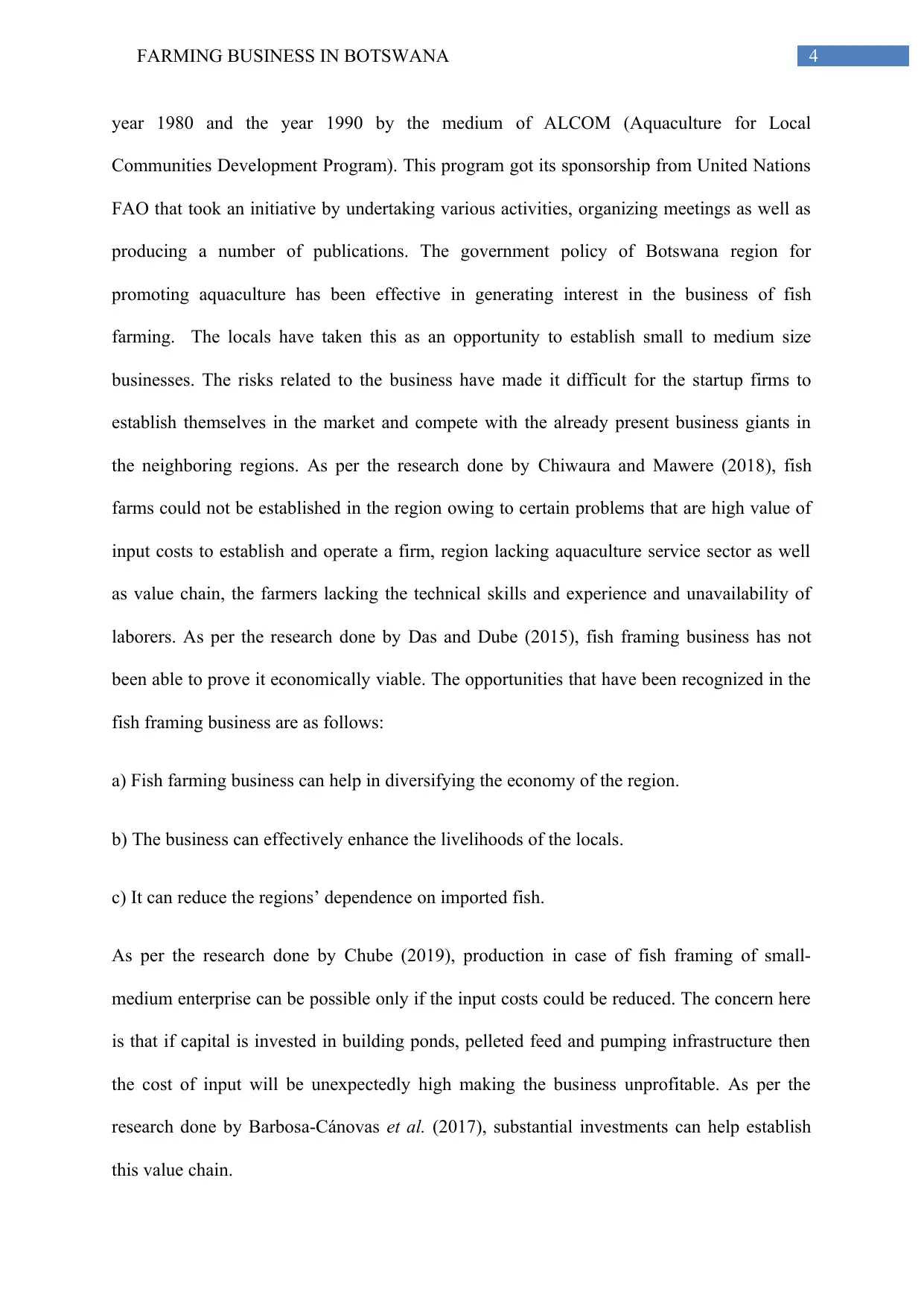
4FARMING BUSINESS IN BOTSWANA
year 1980 and the year 1990 by the medium of ALCOM (Aquaculture for Local
Communities Development Program). This program got its sponsorship from United Nations
FAO that took an initiative by undertaking various activities, organizing meetings as well as
producing a number of publications. The government policy of Botswana region for
promoting aquaculture has been effective in generating interest in the business of fish
farming. The locals have taken this as an opportunity to establish small to medium size
businesses. The risks related to the business have made it difficult for the startup firms to
establish themselves in the market and compete with the already present business giants in
the neighboring regions. As per the research done by Chiwaura and Mawere (2018), fish
farms could not be established in the region owing to certain problems that are high value of
input costs to establish and operate a firm, region lacking aquaculture service sector as well
as value chain, the farmers lacking the technical skills and experience and unavailability of
laborers. As per the research done by Das and Dube (2015), fish framing business has not
been able to prove it economically viable. The opportunities that have been recognized in the
fish framing business are as follows:
a) Fish farming business can help in diversifying the economy of the region.
b) The business can effectively enhance the livelihoods of the locals.
c) It can reduce the regions’ dependence on imported fish.
As per the research done by Chube (2019), production in case of fish framing of small-
medium enterprise can be possible only if the input costs could be reduced. The concern here
is that if capital is invested in building ponds, pelleted feed and pumping infrastructure then
the cost of input will be unexpectedly high making the business unprofitable. As per the
research done by Barbosa-Cánovas et al. (2017), substantial investments can help establish
this value chain.
year 1980 and the year 1990 by the medium of ALCOM (Aquaculture for Local
Communities Development Program). This program got its sponsorship from United Nations
FAO that took an initiative by undertaking various activities, organizing meetings as well as
producing a number of publications. The government policy of Botswana region for
promoting aquaculture has been effective in generating interest in the business of fish
farming. The locals have taken this as an opportunity to establish small to medium size
businesses. The risks related to the business have made it difficult for the startup firms to
establish themselves in the market and compete with the already present business giants in
the neighboring regions. As per the research done by Chiwaura and Mawere (2018), fish
farms could not be established in the region owing to certain problems that are high value of
input costs to establish and operate a firm, region lacking aquaculture service sector as well
as value chain, the farmers lacking the technical skills and experience and unavailability of
laborers. As per the research done by Das and Dube (2015), fish framing business has not
been able to prove it economically viable. The opportunities that have been recognized in the
fish framing business are as follows:
a) Fish farming business can help in diversifying the economy of the region.
b) The business can effectively enhance the livelihoods of the locals.
c) It can reduce the regions’ dependence on imported fish.
As per the research done by Chube (2019), production in case of fish framing of small-
medium enterprise can be possible only if the input costs could be reduced. The concern here
is that if capital is invested in building ponds, pelleted feed and pumping infrastructure then
the cost of input will be unexpectedly high making the business unprofitable. As per the
research done by Barbosa-Cánovas et al. (2017), substantial investments can help establish
this value chain.
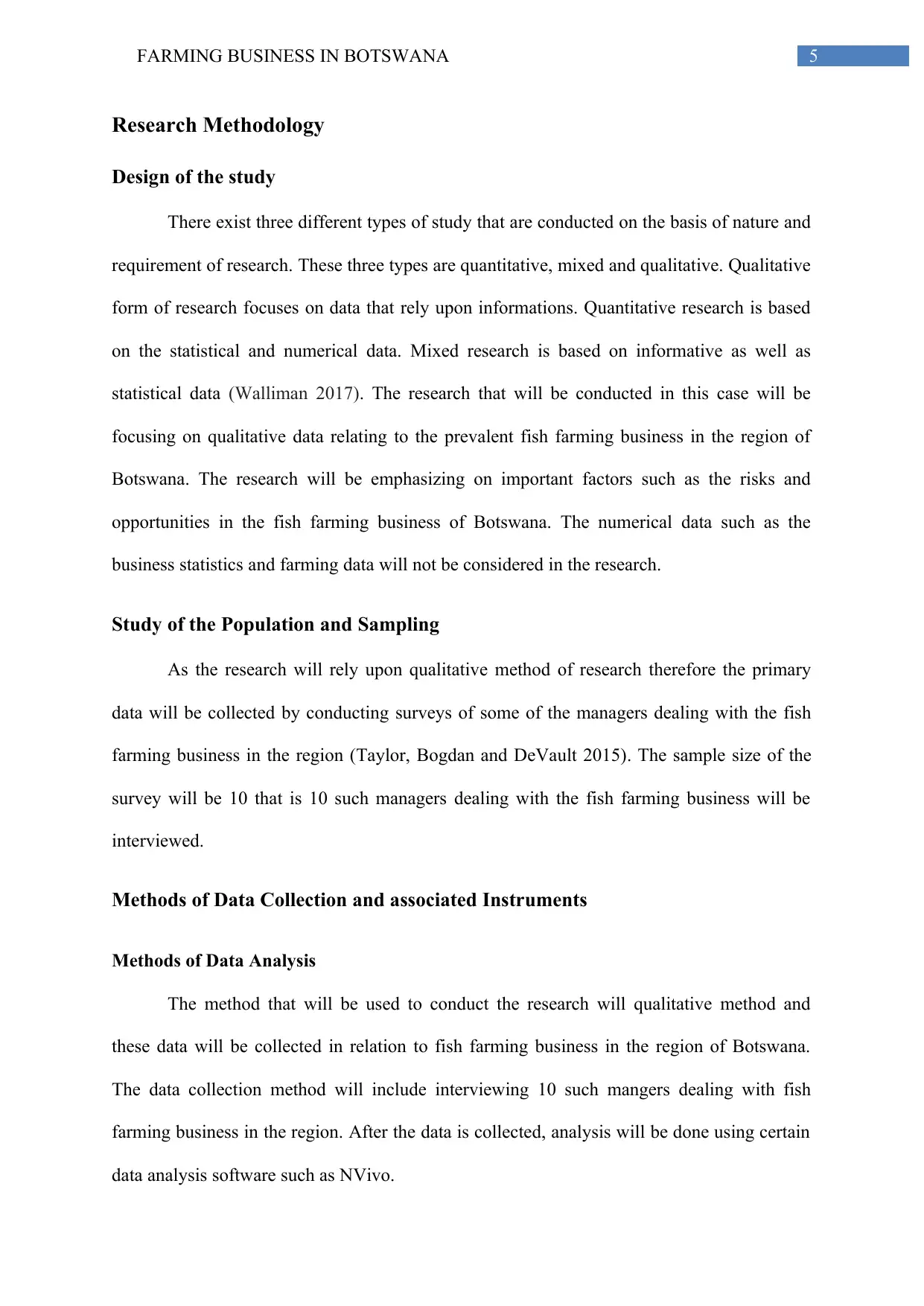
5FARMING BUSINESS IN BOTSWANA
Research Methodology
Design of the study
There exist three different types of study that are conducted on the basis of nature and
requirement of research. These three types are quantitative, mixed and qualitative. Qualitative
form of research focuses on data that rely upon informations. Quantitative research is based
on the statistical and numerical data. Mixed research is based on informative as well as
statistical data (Walliman 2017). The research that will be conducted in this case will be
focusing on qualitative data relating to the prevalent fish farming business in the region of
Botswana. The research will be emphasizing on important factors such as the risks and
opportunities in the fish farming business of Botswana. The numerical data such as the
business statistics and farming data will not be considered in the research.
Study of the Population and Sampling
As the research will rely upon qualitative method of research therefore the primary
data will be collected by conducting surveys of some of the managers dealing with the fish
farming business in the region (Taylor, Bogdan and DeVault 2015). The sample size of the
survey will be 10 that is 10 such managers dealing with the fish farming business will be
interviewed.
Methods of Data Collection and associated Instruments
Methods of Data Analysis
The method that will be used to conduct the research will qualitative method and
these data will be collected in relation to fish farming business in the region of Botswana.
The data collection method will include interviewing 10 such mangers dealing with fish
farming business in the region. After the data is collected, analysis will be done using certain
data analysis software such as NVivo.
Research Methodology
Design of the study
There exist three different types of study that are conducted on the basis of nature and
requirement of research. These three types are quantitative, mixed and qualitative. Qualitative
form of research focuses on data that rely upon informations. Quantitative research is based
on the statistical and numerical data. Mixed research is based on informative as well as
statistical data (Walliman 2017). The research that will be conducted in this case will be
focusing on qualitative data relating to the prevalent fish farming business in the region of
Botswana. The research will be emphasizing on important factors such as the risks and
opportunities in the fish farming business of Botswana. The numerical data such as the
business statistics and farming data will not be considered in the research.
Study of the Population and Sampling
As the research will rely upon qualitative method of research therefore the primary
data will be collected by conducting surveys of some of the managers dealing with the fish
farming business in the region (Taylor, Bogdan and DeVault 2015). The sample size of the
survey will be 10 that is 10 such managers dealing with the fish farming business will be
interviewed.
Methods of Data Collection and associated Instruments
Methods of Data Analysis
The method that will be used to conduct the research will qualitative method and
these data will be collected in relation to fish farming business in the region of Botswana.
The data collection method will include interviewing 10 such mangers dealing with fish
farming business in the region. After the data is collected, analysis will be done using certain
data analysis software such as NVivo.
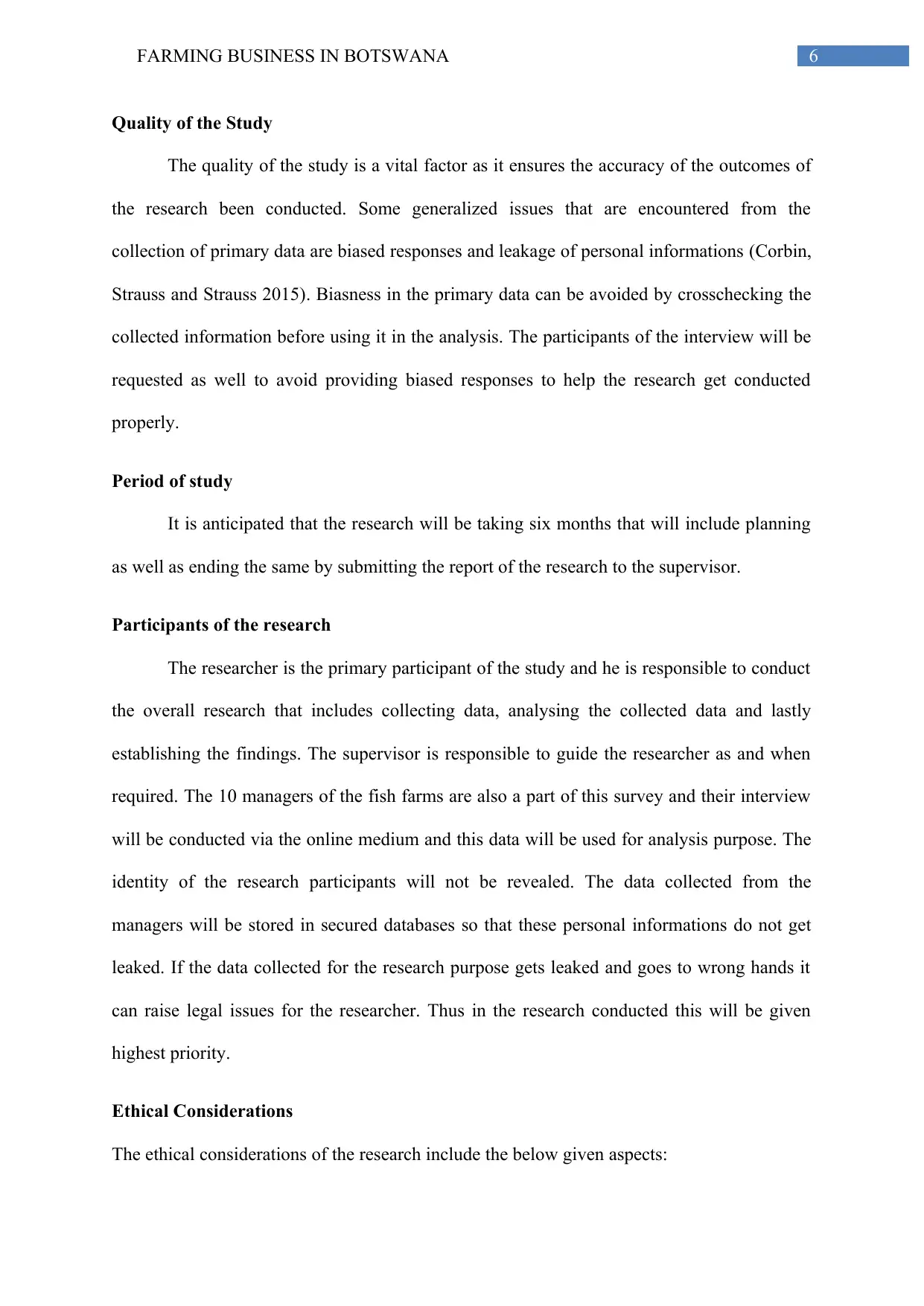
6FARMING BUSINESS IN BOTSWANA
Quality of the Study
The quality of the study is a vital factor as it ensures the accuracy of the outcomes of
the research been conducted. Some generalized issues that are encountered from the
collection of primary data are biased responses and leakage of personal informations (Corbin,
Strauss and Strauss 2015). Biasness in the primary data can be avoided by crosschecking the
collected information before using it in the analysis. The participants of the interview will be
requested as well to avoid providing biased responses to help the research get conducted
properly.
Period of study
It is anticipated that the research will be taking six months that will include planning
as well as ending the same by submitting the report of the research to the supervisor.
Participants of the research
The researcher is the primary participant of the study and he is responsible to conduct
the overall research that includes collecting data, analysing the collected data and lastly
establishing the findings. The supervisor is responsible to guide the researcher as and when
required. The 10 managers of the fish farms are also a part of this survey and their interview
will be conducted via the online medium and this data will be used for analysis purpose. The
identity of the research participants will not be revealed. The data collected from the
managers will be stored in secured databases so that these personal informations do not get
leaked. If the data collected for the research purpose gets leaked and goes to wrong hands it
can raise legal issues for the researcher. Thus in the research conducted this will be given
highest priority.
Ethical Considerations
The ethical considerations of the research include the below given aspects:
Quality of the Study
The quality of the study is a vital factor as it ensures the accuracy of the outcomes of
the research been conducted. Some generalized issues that are encountered from the
collection of primary data are biased responses and leakage of personal informations (Corbin,
Strauss and Strauss 2015). Biasness in the primary data can be avoided by crosschecking the
collected information before using it in the analysis. The participants of the interview will be
requested as well to avoid providing biased responses to help the research get conducted
properly.
Period of study
It is anticipated that the research will be taking six months that will include planning
as well as ending the same by submitting the report of the research to the supervisor.
Participants of the research
The researcher is the primary participant of the study and he is responsible to conduct
the overall research that includes collecting data, analysing the collected data and lastly
establishing the findings. The supervisor is responsible to guide the researcher as and when
required. The 10 managers of the fish farms are also a part of this survey and their interview
will be conducted via the online medium and this data will be used for analysis purpose. The
identity of the research participants will not be revealed. The data collected from the
managers will be stored in secured databases so that these personal informations do not get
leaked. If the data collected for the research purpose gets leaked and goes to wrong hands it
can raise legal issues for the researcher. Thus in the research conducted this will be given
highest priority.
Ethical Considerations
The ethical considerations of the research include the below given aspects:
Paraphrase This Document
Need a fresh take? Get an instant paraphrase of this document with our AI Paraphraser
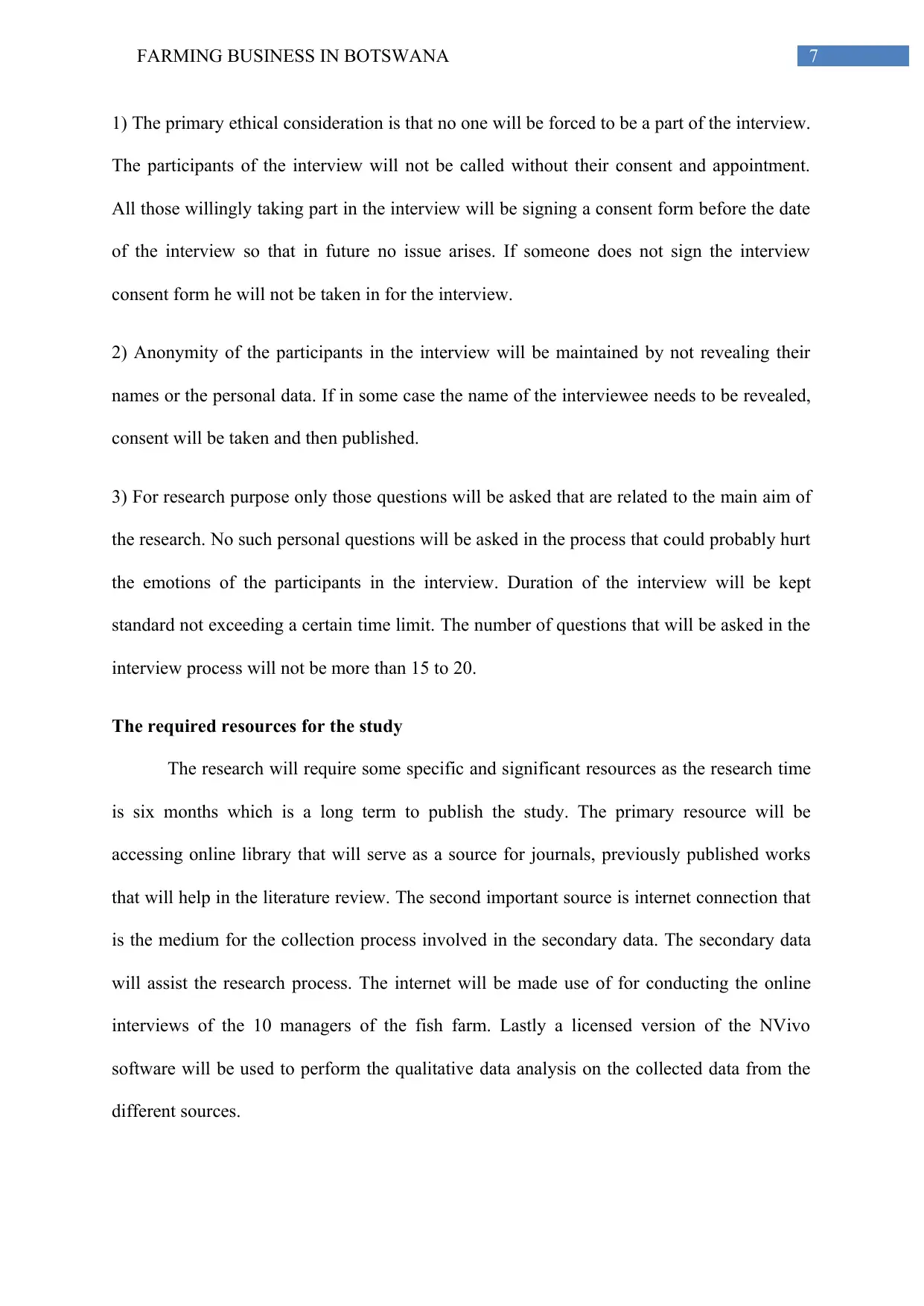
7FARMING BUSINESS IN BOTSWANA
1) The primary ethical consideration is that no one will be forced to be a part of the interview.
The participants of the interview will not be called without their consent and appointment.
All those willingly taking part in the interview will be signing a consent form before the date
of the interview so that in future no issue arises. If someone does not sign the interview
consent form he will not be taken in for the interview.
2) Anonymity of the participants in the interview will be maintained by not revealing their
names or the personal data. If in some case the name of the interviewee needs to be revealed,
consent will be taken and then published.
3) For research purpose only those questions will be asked that are related to the main aim of
the research. No such personal questions will be asked in the process that could probably hurt
the emotions of the participants in the interview. Duration of the interview will be kept
standard not exceeding a certain time limit. The number of questions that will be asked in the
interview process will not be more than 15 to 20.
The required resources for the study
The research will require some specific and significant resources as the research time
is six months which is a long term to publish the study. The primary resource will be
accessing online library that will serve as a source for journals, previously published works
that will help in the literature review. The second important source is internet connection that
is the medium for the collection process involved in the secondary data. The secondary data
will assist the research process. The internet will be made use of for conducting the online
interviews of the 10 managers of the fish farm. Lastly a licensed version of the NVivo
software will be used to perform the qualitative data analysis on the collected data from the
different sources.
1) The primary ethical consideration is that no one will be forced to be a part of the interview.
The participants of the interview will not be called without their consent and appointment.
All those willingly taking part in the interview will be signing a consent form before the date
of the interview so that in future no issue arises. If someone does not sign the interview
consent form he will not be taken in for the interview.
2) Anonymity of the participants in the interview will be maintained by not revealing their
names or the personal data. If in some case the name of the interviewee needs to be revealed,
consent will be taken and then published.
3) For research purpose only those questions will be asked that are related to the main aim of
the research. No such personal questions will be asked in the process that could probably hurt
the emotions of the participants in the interview. Duration of the interview will be kept
standard not exceeding a certain time limit. The number of questions that will be asked in the
interview process will not be more than 15 to 20.
The required resources for the study
The research will require some specific and significant resources as the research time
is six months which is a long term to publish the study. The primary resource will be
accessing online library that will serve as a source for journals, previously published works
that will help in the literature review. The second important source is internet connection that
is the medium for the collection process involved in the secondary data. The secondary data
will assist the research process. The internet will be made use of for conducting the online
interviews of the 10 managers of the fish farm. Lastly a licensed version of the NVivo
software will be used to perform the qualitative data analysis on the collected data from the
different sources.
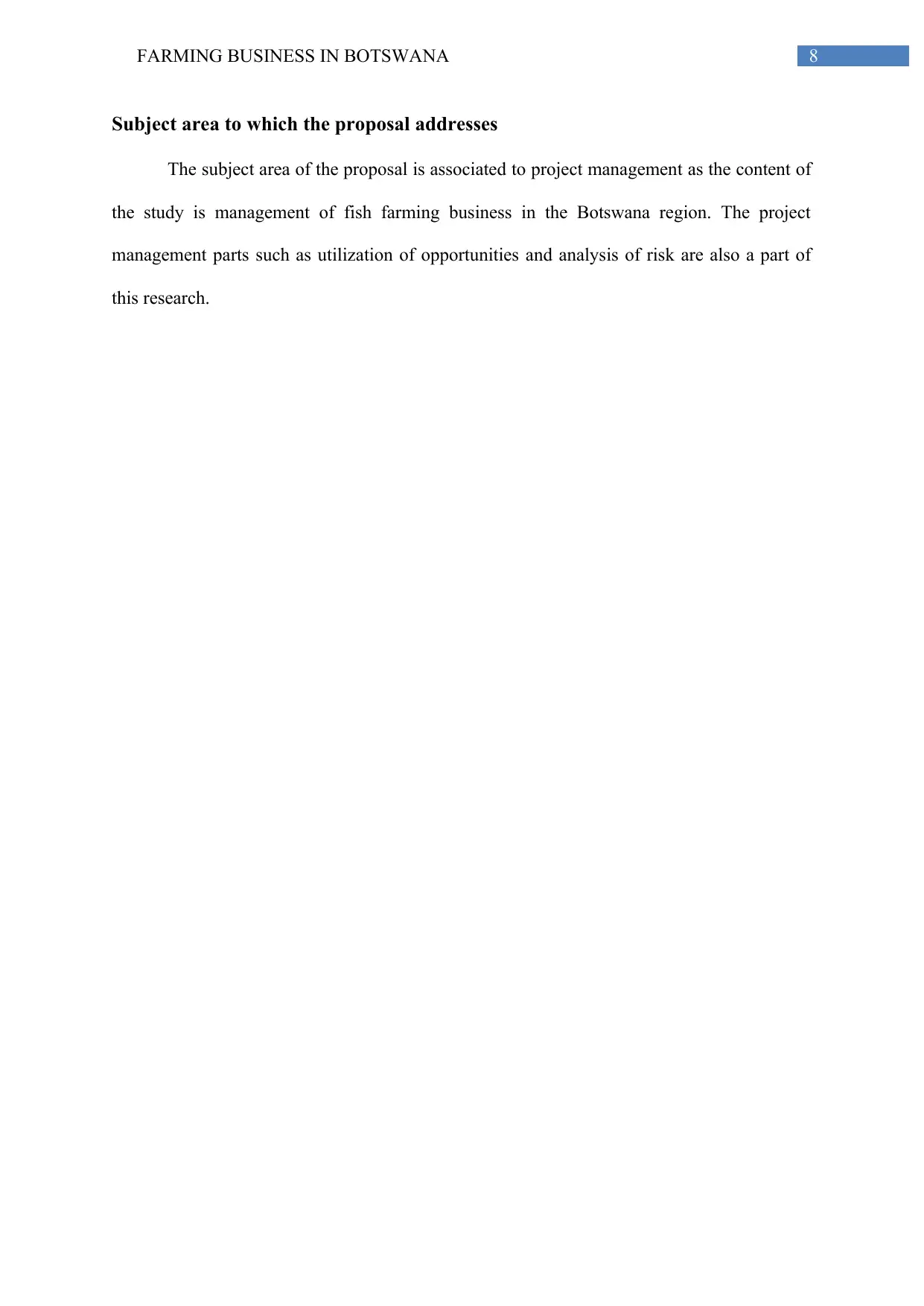
8FARMING BUSINESS IN BOTSWANA
Subject area to which the proposal addresses
The subject area of the proposal is associated to project management as the content of
the study is management of fish farming business in the Botswana region. The project
management parts such as utilization of opportunities and analysis of risk are also a part of
this research.
Subject area to which the proposal addresses
The subject area of the proposal is associated to project management as the content of
the study is management of fish farming business in the Botswana region. The project
management parts such as utilization of opportunities and analysis of risk are also a part of
this research.
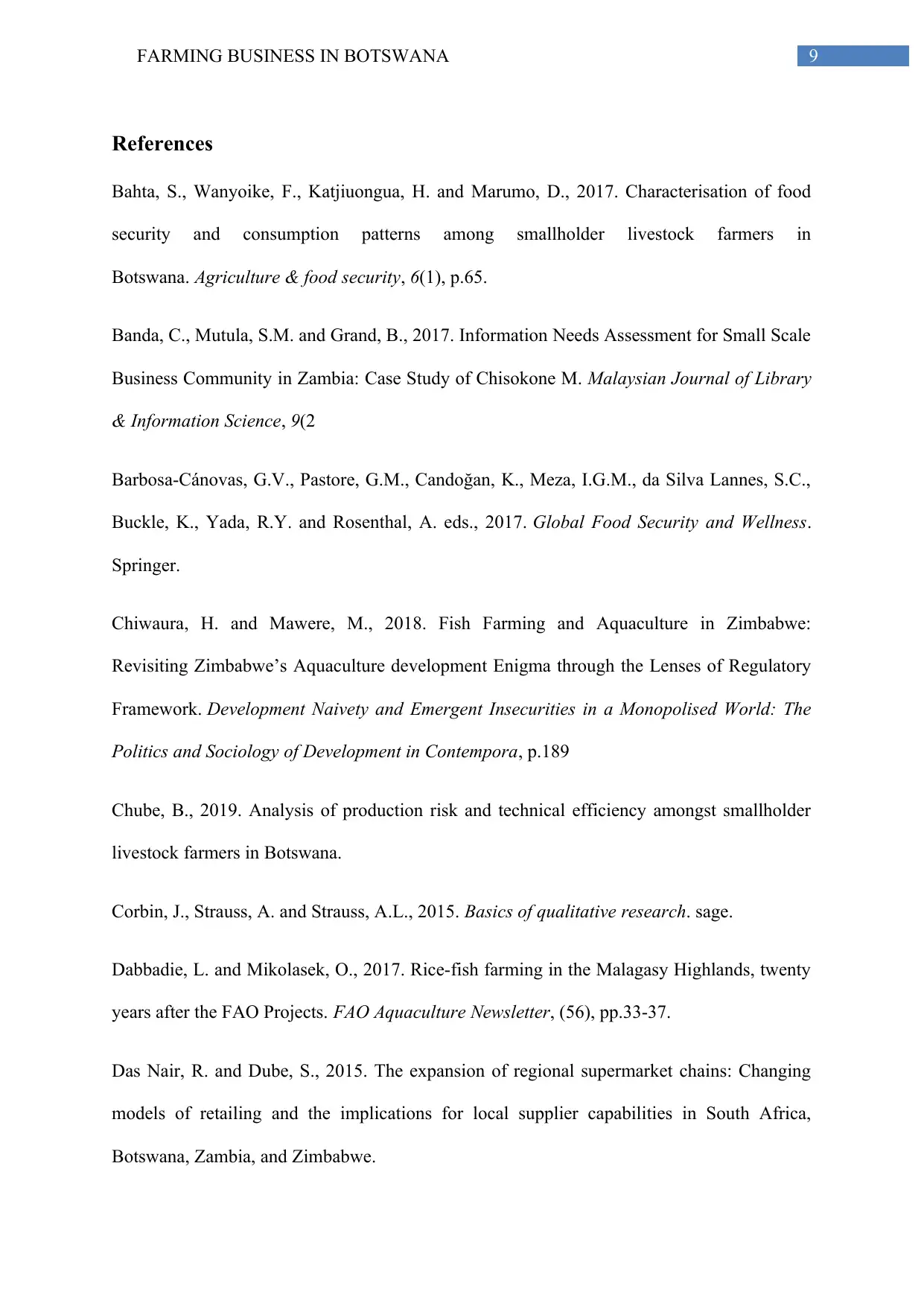
9FARMING BUSINESS IN BOTSWANA
References
Bahta, S., Wanyoike, F., Katjiuongua, H. and Marumo, D., 2017. Characterisation of food
security and consumption patterns among smallholder livestock farmers in
Botswana. Agriculture & food security, 6(1), p.65.
Banda, C., Mutula, S.M. and Grand, B., 2017. Information Needs Assessment for Small Scale
Business Community in Zambia: Case Study of Chisokone M. Malaysian Journal of Library
& Information Science, 9(2
Barbosa-Cánovas, G.V., Pastore, G.M., Candoğan, K., Meza, I.G.M., da Silva Lannes, S.C.,
Buckle, K., Yada, R.Y. and Rosenthal, A. eds., 2017. Global Food Security and Wellness.
Springer.
Chiwaura, H. and Mawere, M., 2018. Fish Farming and Aquaculture in Zimbabwe:
Revisiting Zimbabwe’s Aquaculture development Enigma through the Lenses of Regulatory
Framework. Development Naivety and Emergent Insecurities in a Monopolised World: The
Politics and Sociology of Development in Contempora, p.189
Chube, B., 2019. Analysis of production risk and technical efficiency amongst smallholder
livestock farmers in Botswana.
Corbin, J., Strauss, A. and Strauss, A.L., 2015. Basics of qualitative research. sage.
Dabbadie, L. and Mikolasek, O., 2017. Rice-fish farming in the Malagasy Highlands, twenty
years after the FAO Projects. FAO Aquaculture Newsletter, (56), pp.33-37.
Das Nair, R. and Dube, S., 2015. The expansion of regional supermarket chains: Changing
models of retailing and the implications for local supplier capabilities in South Africa,
Botswana, Zambia, and Zimbabwe.
References
Bahta, S., Wanyoike, F., Katjiuongua, H. and Marumo, D., 2017. Characterisation of food
security and consumption patterns among smallholder livestock farmers in
Botswana. Agriculture & food security, 6(1), p.65.
Banda, C., Mutula, S.M. and Grand, B., 2017. Information Needs Assessment for Small Scale
Business Community in Zambia: Case Study of Chisokone M. Malaysian Journal of Library
& Information Science, 9(2
Barbosa-Cánovas, G.V., Pastore, G.M., Candoğan, K., Meza, I.G.M., da Silva Lannes, S.C.,
Buckle, K., Yada, R.Y. and Rosenthal, A. eds., 2017. Global Food Security and Wellness.
Springer.
Chiwaura, H. and Mawere, M., 2018. Fish Farming and Aquaculture in Zimbabwe:
Revisiting Zimbabwe’s Aquaculture development Enigma through the Lenses of Regulatory
Framework. Development Naivety and Emergent Insecurities in a Monopolised World: The
Politics and Sociology of Development in Contempora, p.189
Chube, B., 2019. Analysis of production risk and technical efficiency amongst smallholder
livestock farmers in Botswana.
Corbin, J., Strauss, A. and Strauss, A.L., 2015. Basics of qualitative research. sage.
Dabbadie, L. and Mikolasek, O., 2017. Rice-fish farming in the Malagasy Highlands, twenty
years after the FAO Projects. FAO Aquaculture Newsletter, (56), pp.33-37.
Das Nair, R. and Dube, S., 2015. The expansion of regional supermarket chains: Changing
models of retailing and the implications for local supplier capabilities in South Africa,
Botswana, Zambia, and Zimbabwe.
Secure Best Marks with AI Grader
Need help grading? Try our AI Grader for instant feedback on your assignments.
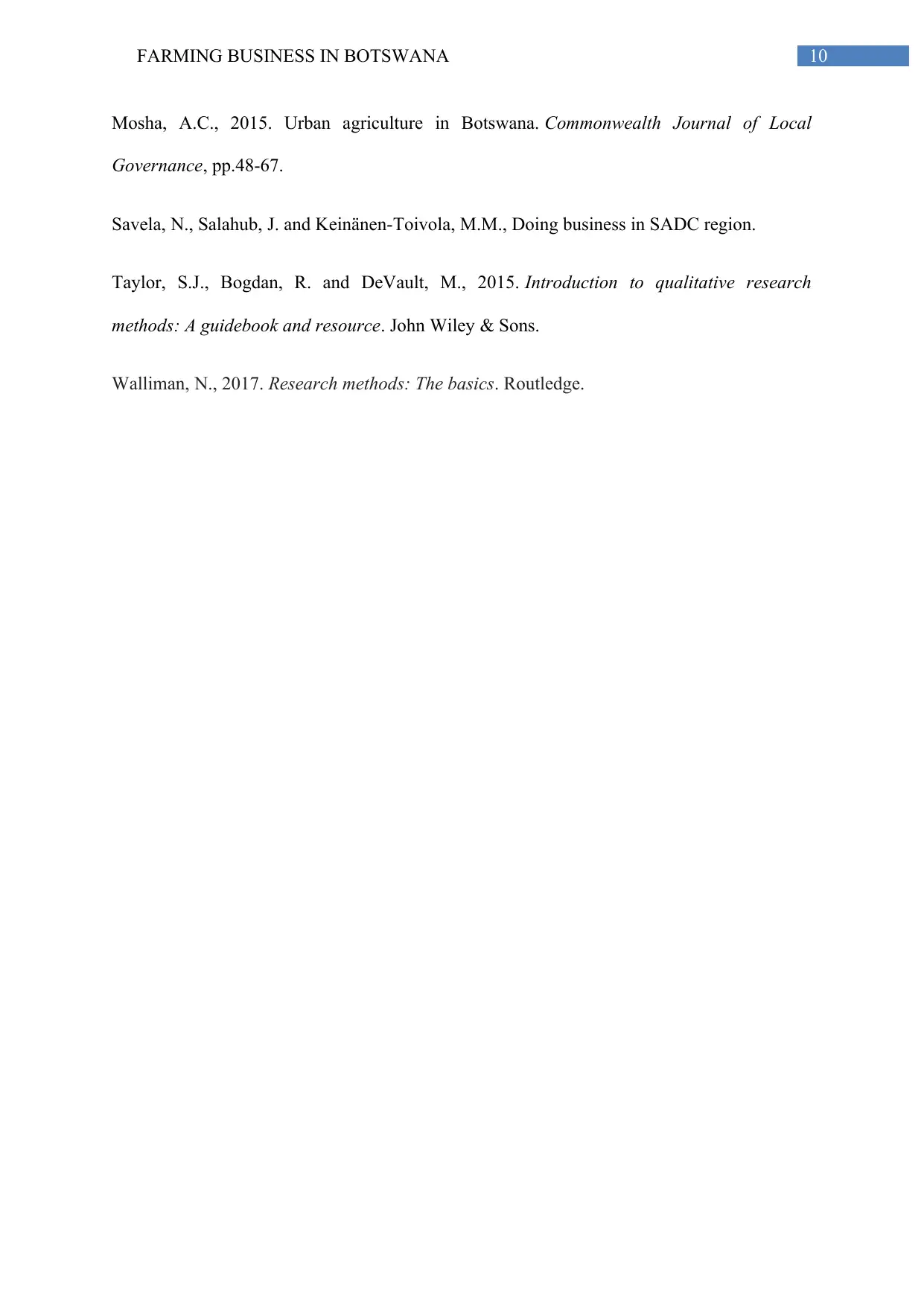
10FARMING BUSINESS IN BOTSWANA
Mosha, A.C., 2015. Urban agriculture in Botswana. Commonwealth Journal of Local
Governance, pp.48-67.
Savela, N., Salahub, J. and Keinänen-Toivola, M.M., Doing business in SADC region.
Taylor, S.J., Bogdan, R. and DeVault, M., 2015. Introduction to qualitative research
methods: A guidebook and resource. John Wiley & Sons.
Walliman, N., 2017. Research methods: The basics. Routledge.
Mosha, A.C., 2015. Urban agriculture in Botswana. Commonwealth Journal of Local
Governance, pp.48-67.
Savela, N., Salahub, J. and Keinänen-Toivola, M.M., Doing business in SADC region.
Taylor, S.J., Bogdan, R. and DeVault, M., 2015. Introduction to qualitative research
methods: A guidebook and resource. John Wiley & Sons.
Walliman, N., 2017. Research methods: The basics. Routledge.
1 out of 11
Related Documents
Your All-in-One AI-Powered Toolkit for Academic Success.
+13062052269
info@desklib.com
Available 24*7 on WhatsApp / Email
![[object Object]](/_next/static/media/star-bottom.7253800d.svg)
Unlock your academic potential
© 2024 | Zucol Services PVT LTD | All rights reserved.





